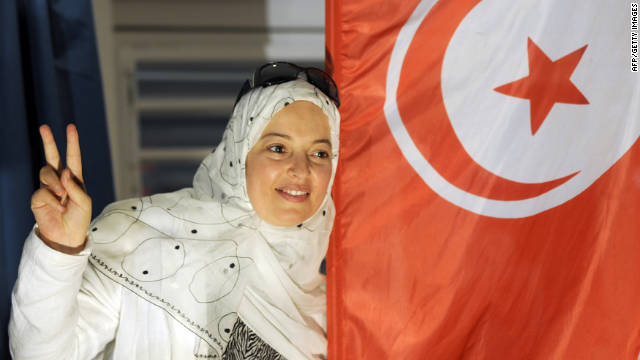Tunisia Feature: Islamists, Faith, and Democracy (Shadid)
 An Ennadha Party SupporterIn what may be his final article for The New York Times --- published yesterday but written before his death in Syria on Thursday ---Anthony Shadid profiles the Islamist movement in Tunisia, a year after the fall of the Ben Ali regime, with an interview with Said Ferjani, a senior member of the Ennahda Party:
An Ennadha Party SupporterIn what may be his final article for The New York Times --- published yesterday but written before his death in Syria on Thursday ---Anthony Shadid profiles the Islamist movement in Tunisia, a year after the fall of the Ben Ali regime, with an interview with Said Ferjani, a senior member of the Ennahda Party:
The epiphany of Said Ferjani came after his poor childhood in a pious town in Tunisia, after a religious renaissance a generation ago awakened his intellect, after he plotted a coup and a torturer broke his back, and after he fled to Britain to join other Islamists seeking asylum on a passport he had borrowed from a friend.
Twenty-two years later, when Mr. Ferjani returned home, he understood the task at hand: building a democracy, led by Islamists, that would be a model for the Arab world.
“This is our test,” he said.
If the revolts that swept the Middle East a year ago were the coming of age of youths determined to imagine another future for the Arab world, the aftermath that has brought elections in Egypt and Tunisia and the prospect of decisive Islamist influence in Morocco, Libya and, perhaps, Syria is the moment of another, older generation.
No one knows how one of the most critical chapters in the history of the modern Arab world will end, as the region pivots from a movement against dictatorship toward a movement for something that is proving far more ambiguous. But the generation embodied by Mr. Ferjani, shaped by jail, exile and repression and bound by faith and alliances years in the making, will have the greatest say in determining what emerges.
Their ascent to the forefront of Arab politics charts the lingering intellectual and organizational prowess of the Muslim Brotherhood, a revivalist movement founded by an Egyptian schoolteacher in a Suez Canal town in 1928. But intellectual currents that once radiated from Egypt now just as often flow in the other direction, as scholars and activists in Morocco and Tunisia, perched on the Arab world’s periphery and often influenced by the West, export ideas that seek a synthesis of what the most radical Islamists, along with their many critics here and in the West, still deem irreconcilable: faith and democracy.
More often than not, they are asking societies for trust that, given the experiences of Iran’s 1979 Islamic Revolution or the Islamist-led coup in Sudan in 1989, authoritarian leaders and secular forces are reluctant to offer.
Mr. Ferjani, a 57-year-old self-taught intellectual as exuberant as he is pious, acknowledges the doubts. In one of several interviews, he declared that history — a word he uses often — would judge his generation not on its ability to take power but rather on what it did with power, which has come after four decades of activism.
“I can tell you one thing, we now have a golden opportunity,” he said, smiling. “And in this golden opportunity, I’m not interested in control. I’m interested in delivering the best charismatic system, a charismatic, democratic system. This is my dream.”

 Saturday, February 18, 2012 at 10:08
Saturday, February 18, 2012 at 10:08
Reader Comments